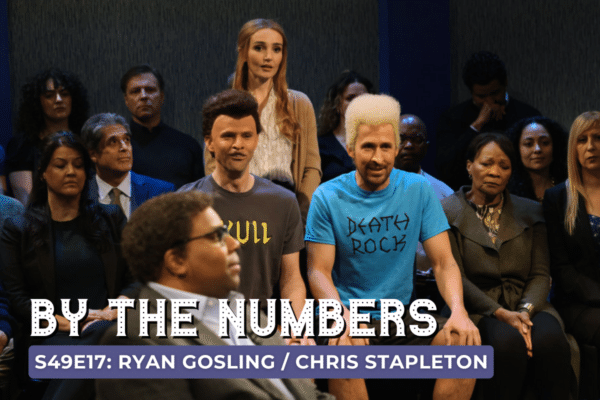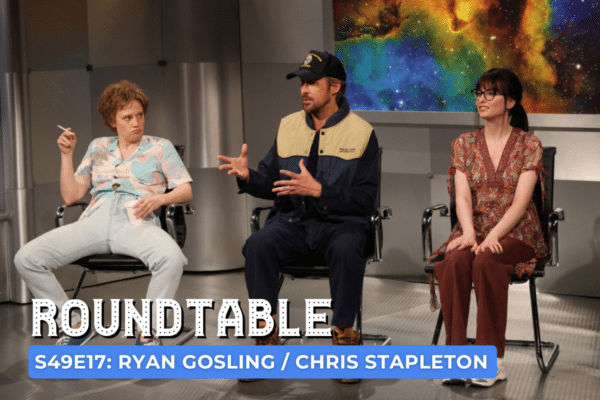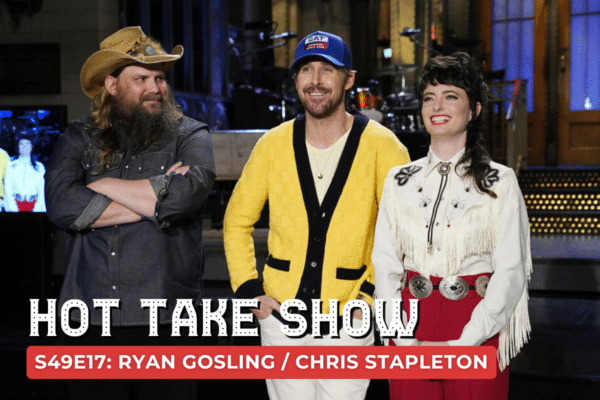
Editor’s note: Eric Deggans is NPR’s first full-time TV critic, also serving as media analyst and guest host for the network. We’re thrilled to welcome him as a contributor to LateNighter.
When I ask Dulcé Sloan The Question, she reacts like I’ve just asked if a unicorn can ride around on a dolphin.
From my perspective, it seemed an obvious ask: If the powers now running The Daily Show decide — after more than a year of looking for a permanent host to succeed Trevor Noah — to offer the job to her, would she accept it?
But Sloan insists the concept is so unlikely, she can’t even imagine it — despite having guest hosted the show once (her week was cut short by the writer’s strike last year). She also performed alongside a lineup of guest hosts that included Sarah Silverman, D.L. Hughley, John Leguizamo and Chelsea Handler. Her point: late-night TV these days doesn’t seem all that interested in hiring Black women to host anything.
“I’m just telling you the reality of the situation…that’s not going to happen,” says Sloan, speaking from a room in Austin, where she’s been doing standup comedy dates and promoting her new book, “Hello Friends! Stories of Dating Destiny and Day Jobs.”
“I’m paying attention and I work there. It’s not about whether they asked me; it’s why they didn’t ask Roy,” she adds, referring to former correspondent and friend Roy Wood Jr., who left The Daily Show last year after a well-regarded guest hosting stint, saying the show hadn’t offered him the top job and he was ready to move on. “Because if they didn’t ask Roy they sure as hell ain’t going to ask me. If they’re getting rid of all of the diversity in late night, why would they turn around and ask me?”
Sloan is referring to something else we talked about; how late-night TV seems to be returning to the province of white-guy hosts, after a brief moment of more inclusion. Samantha Bee, Ziwe, Amber Ruffin, Desus & Mero and Trevor Noah have all left the late night TV space in recent years, leaving Sloan skeptical that anyone in the TV industry wants to add more non-white voices or women to the mix.
“This is what’s happening with everything,” she adds. “Look at all the shows that are getting canceled. [Hulu’s] This Fool was hilarious. It got canceled and nobody knows why. It looks like this is what the directive is. And so, I can’t worry about everything as a whole, because that just takes your brain somewhere it’s not supposed to go. It’s too big for my brain.”
Sloan says the atmosphere at The Daily Show has lightened a bit recently, since longtime host Jon Stewart returned to the show in February. Stewart will host the show on Mondays through the presidential election and likely stay even longer as an executive producer –– as the guy who hosted the show for 16 years before selecting Noah as a successor, he seems uniquely positioned to help the program figure out its host problem.
“With Jon coming back, everyone in the building has relaxed because it’s like, ‘Okay, we’re probably not going to get canceled now,’” Sloan adds. “Comedy Central is always an interesting place to be. TV right now is an interesting place to be. So yeah, there are a lot of people who are like, ‘My kids can stay in private school.’ We’re probably not going to get canceled right now. That’s the main thing.”
The interview below has been edited for length and clarity.
Could you talk a little bit about what inspired you to write your book in the first place?
Well, my manager tricked me. I really didn’t intend to write a book. He called me one day, and was like ‘What if you wrote a book?’ And I was like, ‘I’m tired. I don’t want to do that because I’m already busy.’ And he was like, ‘Well, let’s just take a meeting’…Four meetings later, he was like, ‘Okay, well somebody wants to buy your idea, so you gotta write a book now.’ I called Michelle Buteau because she wrote her book “Survival of the Thickest.” And I was like, ‘How do I do this?’ And she said, ‘Start with stories that are too long for you to tell onstage.’ So I kind of started from a place of comedy with the book. That’s why I don’t really call it a memoir.
You can have an idea of what a book is before you start writing, and then it can change and develop as the writing process goes on. Did that happen to you?
I think I knew from the beginning I was going to be talking about funny stories and either things I want to do as jokes but were too long and didn’t have the context. The editor was, like, this could be an inspirational thing. Just like talking about how I started my own business when I was nine. And I’ve always had businesses. I’ve always worked –– that’s why I’m exhausted, because I’ve been working since I was nine years old. I’ve been looking at things I did when I was 25 that have affected my life now that I’m 40. And being nice to myself about all the decisions that I made when I was 25. I say a lot of times to my friends, I feel like I live half a life because I’m only fulfilled professionally. They’re always trying to get me out of that mindset. I made the best decisions that I could, based on the information that I had when I was 25. And I’m still doing that. I’m in a place where I’m trying to be nicer to myself.
Was deciding to be a standup comic one of those tough decisions?
I mean, the only decisions that were hard were the personal life decisions. It wasn’t starting standup. Standup wasn’t anything I expected to do. [But] there was a comedian, Big Kenny — him and some other comics told me that I was a comic and I needed to start taking standup classes. It took Big Kenny two years to convince me to take a stand up class. And then my mom told me she had a dream one day that the whole world was laughing at me. So we all know as Black people, if your mother has a dream – all right, all right, I’m going to work on it. And so between [Big Kenny] and my mother having a dream, I was like, let me just see what happens. That was 2009; now it’s my 15th year doing standup.
What do you think they saw in you?
I’ve been an actor since I was a kid and I’ve been a storyteller my whole life. [Kenny said] you already know how to tell a funny story. I just need to hone in those skills for you. He’s like, ‘you are supposed to do this.’ I had gotten laid off from a job. I don’t have the $300 fee — that’s basically my whole unemployment check for the week. And he was like, ‘You’re supposed to be doing this. I’m not going to charge you for the class.’ So sometimes people see skill in you that you can’t see in yourself.
You said your professional life is so much better than your personal side. Why?
The problem is that men are intimidated by me. It’s like I’m supposed to be thankful that any man even speaks to me. I started going to therapy a couple of years ago. And I had to realize — any man I would have married before I started going to therapy, I would have divorced by now.
Do you think that the qualities that make you a successful stand up also intimidate men?
Absolutely. But you have to remember I’m a fat woman; I’m supposed to be grateful for any man that that wants to talk to me. That is the main problem. I’m not running around, [saying] ‘Thank you sir, thank you sir.’ There are men who appreciate me as a whole person. But those same men do not want to marry me. Women want men to want them. Men want women to need them. And that was the trap the whole time. You cannot trap a man with a baby; you trap a woman with a baby. You have to be brave enough to say what you want and you have to be brave enough to walk away from what you don’t want. Sometimes having attention is worse than being alone.
This reminds me a little bit of the part in your book where you talk about how some comics try to talk to you about how you got on The Daily Show, mostly to find out how you can help THEM get on The Daily Show.
Yeah, it’s two responses on The Daily Show. They [either] say, ‘That’s great.’ And that’s the end of the sentence. They’re genuinely happy for me. The other one is, ‘How did you get that?’ You’re not happy for me at all. You want me to give you cheat codes. A lot of these comics don’t understand: This is one of a few industries where input does not always relate to output. You could do 300 shows a week, that does not mean you get to headline anywhere. This is a marathon, not a sprint. So you might have gotten to do things before me. But if we’re on a show together and you’re not stronger than me, you’re not going to do what I’m going to do. The whole point is longevity. And the whole point is to keep working. What am I creating? What am I doing to create, continue to build this? There’s an inherent competitiveness because now I’m in a male dominated industry and I have the audacity to be successful in a male dominated industry.
What’s the story about how you actually got on The Daily Show? I assume you auditioned?
First of all, thank you for assuming that I auditioned. There’s so many times when comics would ask me how you got on The Daily Show, and I go, ‘I auditioned’ and they’re like, ‘What do you mean?’ I was like, ‘How do you think you get on a TV show? I auditioned, you goofy bitch.’ I didn’t even want to audition, because I did not want to move to New York.
On the first Daily Show episode Jon Stewart hosted this year, you had a great joke about how people don’t want to see a show with the same old face coming back. Did you write that?
No. You have to understand, the correspondents are not writers on the show. For me [the last year] wasn’t as jarring. Because I’m not having to acclimate to someone’s writing style and who they are as a person, every single week. When we started doing these guest hosts [the feeling toward them is] ‘hey, you don’t work here. You haven’t been here as long as we’ve been here.’ I’m going to have to take on this role that Trevor had, giving myself notes and making stuff more concise and editing things down after rehearsal. It was a little bit more responsibility to get scripts written because I knew the voice of the show better than this guest host, and I know my voice on the show better.
Do you think much about where you want to be in the next five years?
Absolutely. My goal is to get back into acting.
Does it matter? Film or TV?
I want to work. The goal in my life was to make a living as a performer. I’m doing it. So if it’s standup, if it’s acting, if it’s singing…the medium doesn’t matter. I had a radio show when I was in college. I’ve done a lot of different things to make sure that I never go back to selling stucco. That’s the goal: To never have to sell stucco or do bilingual customer service ever again.










